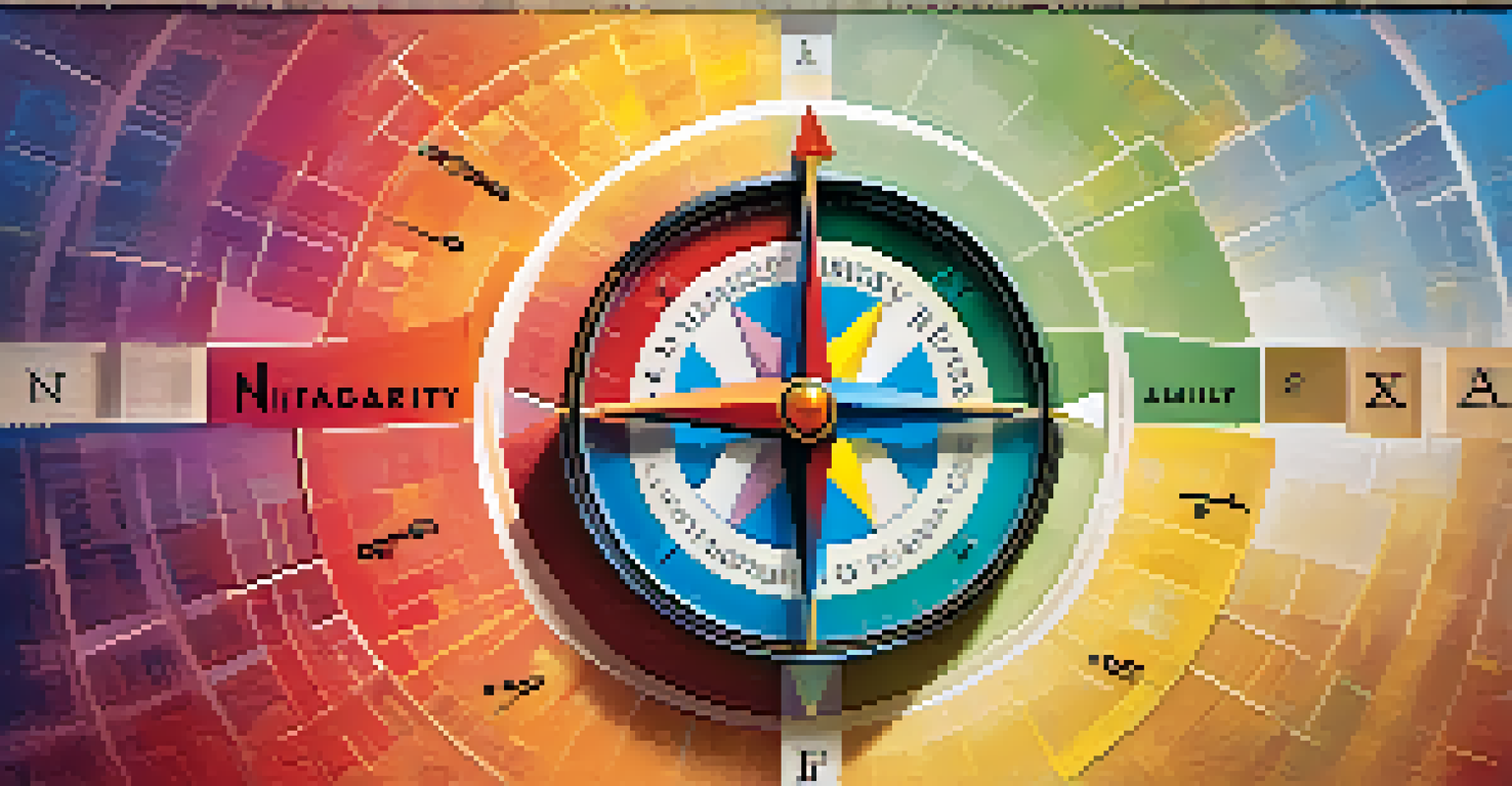Aligning Career Mapping with Personal Values and Ambitions

Understanding the Importance of Career Mapping
Career mapping is more than just planning your next job; it's about envisioning your professional journey. It involves identifying where you are now, where you want to go, and how to bridge that gap. By clearly outlining your career goals, you can create a roadmap that leads to fulfillment and success.
The only way to do great work is to love what you do.
Think of career mapping as a treasure map. Just as a treasure map guides you to hidden riches, a well-structured career path helps you uncover opportunities that align with your personal values and ambitions. This clarity not only motivates you but also makes it easier to make informed decisions along the way.
Ultimately, the process of career mapping empowers you to take charge of your future. It encourages self-reflection and helps you understand what truly matters to you, making your career journey not just a series of jobs, but a meaningful pursuit.
Identifying Your Personal Values
Your personal values are the core principles that guide your decisions and actions. They can include things like integrity, creativity, family, or achievement. Identifying these values is crucial because they serve as the foundation for your career decisions.

To discover your values, consider reflecting on moments when you felt most fulfilled or frustrated in your work. What was happening at those times? Understanding the underlying themes can help you pinpoint what truly drives you.
Career Mapping for Success
Career mapping helps you envision your professional journey by identifying your current position, future goals, and the steps needed to bridge that gap.
Once you've identified your values, you can use them as a compass in your career mapping process. This alignment will not only enhance job satisfaction but also foster a sense of purpose in your professional life.
Setting Ambitious Yet Achievable Career Goals
Setting career goals is a crucial step in aligning your career map with your personal values. These goals should be both ambitious and realistic, challenging you to grow while remaining attainable. Think about where you see yourself in five to ten years and what steps you need to take to get there.
Success is not the key to happiness. Happiness is the key to success. If you love what you are doing, you will be successful.
To make your goals SMART—Specific, Measurable, Achievable, Relevant, and Time-bound—break them down into smaller, actionable steps. This approach not only makes the process less overwhelming but also gives you milestones to celebrate along the way.
Remember, your goals should reflect your personal values and ambitions. When your career aspirations resonate with your core beliefs, you're more likely to stay motivated and committed to achieving them.
Exploring Career Options That Align with Your Values
With a clear understanding of your values and goals, it's time to explore career options that resonate with them. Research industries and roles that align with your principles, and consider how they can fulfill your ambitions. This exploration phase is vital for making informed choices about your future.
Networking can be incredibly helpful during this phase. Engage with professionals in fields of interest, attend industry events, and seek informational interviews to gain insights into various career paths. These conversations can reveal unexpected opportunities that align with your values.
Align Goals with Personal Values
Identifying your personal values is essential for setting career goals that truly resonate with you, enhancing job satisfaction and purpose.
Additionally, don't hesitate to consider unconventional paths. Sometimes, the most fulfilling careers are those that may not fit the traditional mold but resonate deeply with who you are.
Leveraging Skills and Experiences for Career Advancement
Your skills and experiences are valuable assets in your career journey. Assess what you bring to the table and how those strengths align with your desired career path. This self-awareness can help you effectively market yourself to potential employers or seek out new opportunities.
Consider taking on projects or roles that allow you to develop new skills while aligning with your values. For example, if community engagement is important to you, volunteering for a leadership role in a nonprofit can enhance your skills and deepen your commitment to that value.
Remember, continuous learning is key to career advancement. Stay curious and open to new experiences, as they can lead to unexpected opportunities that align with your ambitions.
Navigating Challenges and Roadblocks
Every career journey has its challenges and roadblocks, but how you navigate them can make all the difference. When faced with obstacles, it's essential to revisit your values and goals to maintain perspective. This reflection can help you stay grounded and focused on what truly matters.
Consider developing a support system of mentors, colleagues, or friends who can provide guidance during tough times. Their experiences can offer valuable insights and encouragement, helping you to persevere in the face of adversity.
Embrace Adaptability in Careers
A career map should evolve over time, requiring regular evaluation and adjustment to ensure it aligns with your changing values and ambitions.
Lastly, embrace a growth mindset. View challenges as opportunities for learning and growth rather than setbacks. This shift in perspective can empower you to tackle difficulties with resilience and determination.
Evaluating and Adapting Your Career Map
A career map is not a static document; it's a living, breathing plan that should evolve as you grow. Regularly evaluate your progress and reassess your values and goals, especially as your life circumstances change. This adaptability ensures that your career path remains aligned with your personal ambitions.
Set aside time each year to reflect on your journey. Are you still passionate about your chosen path? Have your values shifted? By making adjustments as needed, you can keep your career map relevant and meaningful.

Remember, it's okay to pivot. Life is full of unexpected twists and turns, and embracing change can lead to new opportunities that align with who you are becoming.